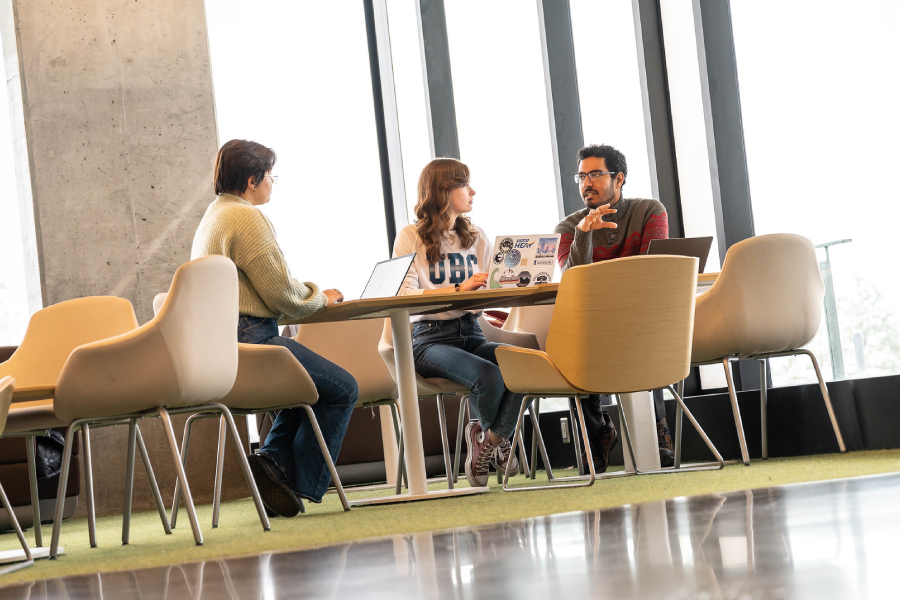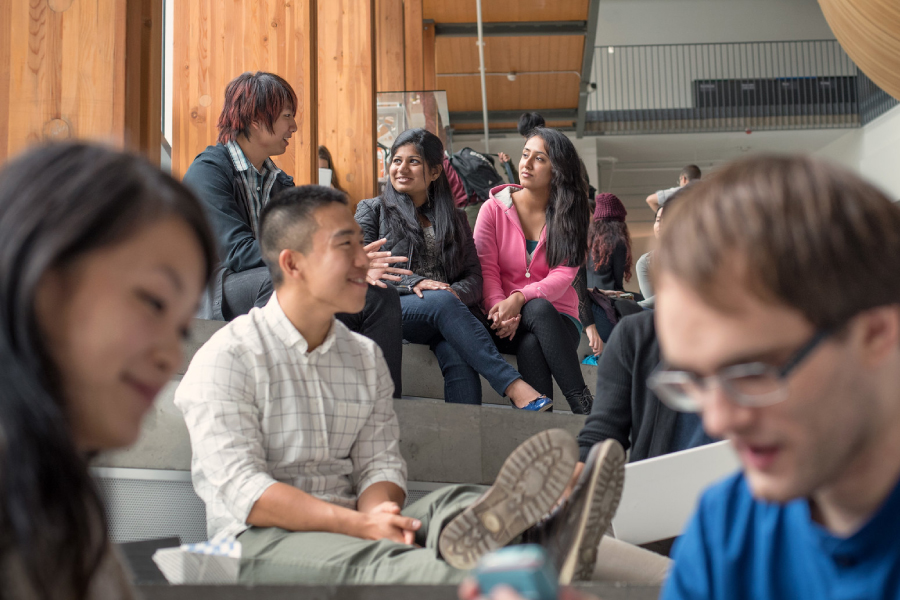Despite advancement in education, traditional lecture-style teaching and learning remains the norm where instructors convey knowledge while students passively receive it. However, alternative pedagogical models are developing – such as the Students as Partners (SaP) approach – giving students an opportunity to work in partnership with faculty to re-design academic courses and have a voice in their own learning experience.
The right fit for a different approach
UBC’s SaP program is an initiative that aims to involve students in the co-creation and co-design of their educational experience. It encourages them to take an active role in the redesign and implementation of their courses and to provide feedback and suggestions for improvement through funded course design and redesign grants. This partnership between faculty and staff, which is a key pillar of UBC’s commitment to student engagement and success, helps students gain valuable skills and experience in course design while contributing to the overall quality of their education.

Dr. Pheroze Unwalla, assistant professor of teaching in the Department of History and Chair of Middle East Studies, has been using this approach even before learning about the SaP fund. “In many ways, I had been working with students as partners even before I knew the term existed. I didn’t know about this approach and the whole body of literature on the subject until I saw the call for the SaP in Course Design Grant.”
Immediately, he saw an opportunity for the core MES course, MES 300 The Middle East: Critical Questions & Debates; an innovative, interdisciplinary course that introduces students to the study of the Middle East. “The Middle East Studies program was created through a collaboration between myself and several UBC students,” Pheroze explains. “So I thought, wouldn’t it be amazing if I could have former MES300 students work with me in revising the course? It seemed like a perfect fit.”
In the early stages, Pheroze contacted three former students who shared his passion for Middle East Studies. Magdalen Hamilton, a fourth-year student majoring in international relations, was excited by the project. “I saw SaP as an opportunity to put my experience and interests into the program.” Sophie Roth, who graduated from UBC in the spring of 2022 and now works in the non-profit sector, saw a way to improve the experience of a course she had taken in the past. “We were all involved in wanting to impact the program, our group was a good fit.” A statement that Yasmina Seifeddine, a third-year student majoring in Geography, couldn’t agree more with. “We all collectively care about the Middle East in different ways.”
Together with Pheroze they embarked on a collaborative journey to transform how MES300 is taught at UBC, position SaP at the heart of MES, and reimagine the possibilities of academic work and relationship at UBC.
A beneficial experience for all
Once the team began working together, Pheroze quickly realized the benefits of adding more student perspectives into his teaching approach. “You start to understand what is important to them, which issues resonate with them, and how to include them in a way that’s engaging.”

In Sophie’s mind, this collaboration made perfect sense. “I think it’s really important to include students’ perspectives, because while instructors play a vital role in academic programs, students are the main body of people engaging with and being impacted by university courses.”
For Pheroze, the SaP approach meant gaining invaluable feedback on his experimental pedagogical approaches, assignments, and strategies. “I used different kinds of pedagogies, such as breaking down certain classroom hierarchies and building more equitable relationships through certain activity group work and in the way the class was run.” Working in partnership with students, they were able to revision the course in ways that would not have otherwise been possible. “I have discovered so much more about how undergraduate students learn, what engages them, and how to further build this program so that it is successful in many different ways.”
In the past, Pheroze had also applied for and received Scholarship of Teaching and Learning funding to study his students’ perception of the course’s emotionality and community-building interventions, and its impact on them. He then shared the data with the three partners. “Magdalen, Yasmina and Sophie have been wonderful in helping me make sense of the data, providing useful context, and re-thinking some in-class activities. They came up with all sorts of suggestions that we have included into class assignments.”
Students benefits of a SaP approach are also plenty, and can be seen in unexpected forms, as Sophie explains. “It encourages more meaningful considerations of students’ perspectives, for us as partners but also for current undergraduates. Why wouldn’t students be included? Especially given their involvement in creating the Middle East Studies program in the first place.”
When approached with rigour and care, a Students as Partners pedagogy shines because it lets students’ role evolve beyond class activities adjustments. “In a way,” Yasmina explains, “we are bridging the gap between past and future cohorts, creating a more ideal learning environment.”
From passive learners to active partners
Yasmina looks fondly at the collaboration, and attributes its success to the level of trust between all participants. “Since all of us had an established relationship with Dr. Unwalla, our collaboration felt very open and, most importantly, non-hierarchical.”

Mutual trust with his students was essential to Pheroze as well, and a key to relinquishing his authority and control over a course in which he put a lot of himself. “I thought it would be difficult to give up power over my syllabus, because this course means a lot to me,” Pheroze recalls. “But I have known these students for several years, I trusted them to do the work. Instead of focusing on losing control, I thought of it as a means to bring more experiences to the table, lay them out and discuss them as forthrightly as we can, so we could come to a consensus on the best way to proceed. In the end, it was not difficult at all.”
The students did not take this responsibility lightly and embraced the opportunity. “Honestly, it felt like a huge honour,” Magdalen explains. “We all look up to Dr. Unwalla a lot. To be trusted with adapting the MES300 foundational course is a huge privilege. It feels very empowering to have something to bring to the table.”
Even with this trust, everyone still needed to adjust to their new role. “After multiple years in a more traditional educational setting, working as a partner took some time to getting used to,” Sophie remembers. “From the start, the system was not built with student input in mind.”
Pheroze’s main challenge was balancing his role as an instructor and partner. “I didn’t always know what to do, whether to intervene with my experience or to let students run with their ideas and build from that. I was a little anxious about this in the beginning.”
The team, however, learned to embrace this uncertainty as part of the process, with open communication and the trust between them paving a path forward. “Once we started going, I spoke with them honestly about my struggles as an instructor, which really helped.”
All four participants have excitedly been waiting for the re-designed MES300 course to begin this semester, and are thankful for the journey. “It’s been an enlightening experience that inspired me to use SaP in my classrooms even more,” Pheroze summarizes. “The process in itself has been quite wonderful.”
Being involved in such a project was also a way for students to develop unexpected passions. “I never thought that I would be interested in course design, but I found some nice niches within academia that I now love reading about in my free time,” Magdalen explains.
“It was a very eye-opening experience for me as well,” echoes Yasmina. “The SaP project opened up different avenues of what working in academia could look like.”
Despite students being a core component of the SaP model, instructors are still responsible for applying, recruiting and building the framework necessary for the program to take place, which is something that Sophie attributes to habits. “In the past, students viewed their undergraduate experience as something to enter, play by the rules, navigate through courses prepared for them, and then leave. A lot of students don’t know that they can engage with their programs in such a way.”
“It would be amazing to see SaP projects emerge from a student idea before a professor gets involved,” she concludes. All four participants had no doubt that, with passion and mutual trust as driving forces, great student-led projects will emerge.
Apply to the Students as Partners fund by February 24
Have an idea for your own undergraduate course redesign project? Through the Students as Partners fund, faculty and student partners at UBC Vancouver can apply to receive up to $7,100 per project, as well as dedicated support from an assigned Centre for Teaching, Learning and Technology Learning Designer, and access to a learning community.
Submit a project proposal by February 24 at 3pm.

